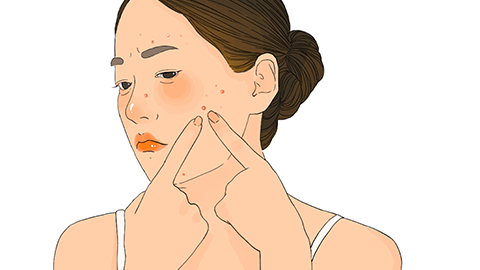How to effectively treat acne scars
Generally speaking, there is no specific method that can effectively treat acne scars. Acne scars may be caused by factors such as skin type, age, improper diet, hormonal changes, severe acne, and others. It is recommended to seek timely medical attention, identify the underlying cause, and proceed with recovery under the guidance of a qualified physician through general treatment, medication, or surgical interventions. A detailed analysis is as follows:

1. Skin Type
Individuals with oily or combination skin are more prone to excessive sebum production, which can lead to clogged pores. During the skin's healing process, imbalanced collagen production may result in skin indentation and the formation of acne scars. It is recommended to use oil-control products in daily skincare and apply deep-cleansing masks regularly to help regulate sebum production. Under medical supervision, aesthetic treatments such as microneedling or fractional laser therapy may be considered to stimulate collagen regeneration and improve acne scars.
2. Age Factors
As people age, the skin's natural healing ability declines, making acne scars more difficult to recover. It is advisable to use skincare products rich in vitamins to promote skin metabolism and collagen synthesis. Additionally, aesthetic treatments may be considered to accelerate skin repair in scarred areas.
3. Improper Diet
Dietary habits may change with the seasons. During seasonal transitions, excessive consumption of greasy, spicy, or sweet foods may lead to improper diet, stimulating abnormal sebaceous gland secretion and resulting in acne scars. It is recommended to adjust dietary habits, consume more fresh vegetables and fruits, and maintain a balanced diet.
4. Hormonal Changes
Hormonal fluctuations, such as those occurring during puberty, menstrual cycles, or pregnancy, may lead to increased sebum production on the facial skin, resulting in acne scars. These may be accompanied by symptoms such as menstrual irregularities, mood swings, or weight changes. It is recommended to regulate lifestyle habits, ensure adequate sleep, maintain a balanced diet, and reduce stress. Additionally, under a doctor's guidance, medications such as spironolactone tablets, fusidic acid cream, or erythromycin ointment may be used.
5. Severe Acne
Severe acne involves strong inflammatory reactions that damage hair follicles and sebaceous glands, leading to destruction of the dermis. After healing, indented acne scars may form, possibly accompanied by redness, pustules, or nodules. It is recommended to seek medical attention promptly and use medications such as aspirin effervescent tablets, hydrocortisone tablets, or paracetamol tablets to reduce inflammation and prevent scar formation. Once scars have formed, treatments such as dermabrasion or microcrystalline collagen filler injections may be employed.
When treating acne scars, it is important to choose appropriate treatment methods based on individual conditions. Additionally, maintaining healthy lifestyle habits and a positive mindset is essential.




